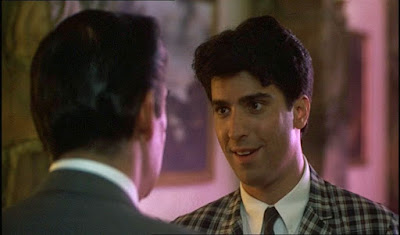 |
| Robbie Gould, the Yale medical student in the movie "Dirty Dancing" |
* Bob and Carol and Ted and Alice in 1969
* Mash in 1970
* The Long Goodbye in 1973
* California Split in 1974
* A Bridge Too Far in 1977
* The Devil and Max Devlin in 1981
* Inside Out in 1986.
In Inside Out, released one year before Dirty Dancing, Gould looked like this:
 |
| Elliott Gould in 1986 |
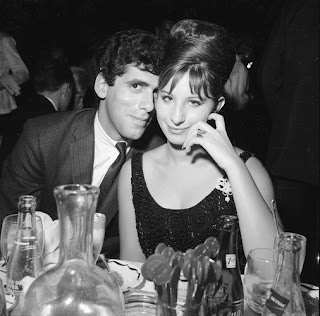 |
| Elliott Gould and Barbra Streisand in the mid-1960s |
When 1987 movie audiences -- especially the Jewish females -- heard a handsome Jewish young man in a Jewish resort being introduced as a Gould, that family name resonated with Elliott Gould. By 1987, however, Elliott had been dumped and divorced by Barbra, and his acting career was only coasting, at best. In 1987, the name Gould suggested the concept of a once handsome but now unreliable Jewish man who had tried to become successful and rich by marrying a rising female star.
In other words, the real-life Elliott Gould now resonated with the movie character Robbie Gould, a medical student who might marry Lisa Houseman, the daughter of a successful, rich doctor.
Now in the year 2017, however, most people watching Dirty Dancing are relatively unfamiliar with the family name Gould. Essentially, the name now makes no impression and suggests no connotations at all.
========
Elliott Gould was born Elliott Goldstein in 1938 (the same year as Dirty Dancing's screenwriter Eleanor Bergstein). His grandparents were Jews who had emigrated from Russia, Poland and Ukraine. He changed his last name to Gould when he began his acting career (his first acting credits are in 1964).
I have studied the family name Gould to write this article.
In past centuries, many Jews worked in metallurgy, gems and jewelry, and so many Jewish family names include the word Gold -- for example, Goldstein, Goldman, Goldberg, Goldblatt, Goldenbaum, Golder, Goldfarb, Goldhaber, Goldschmidt, Goldwasser, and so forth. These family names originated in East Europe among Jews who spoke Yiddish or German.
The word gould is the Scottish pronunciation and spelling for the English word gold. The family name Gould is common in Scotland, Ireland and England. The name Gould suggests an ancestral association with Scottish metals, coins or jewelry, but the metal gold was not mined significantly in Scotland. In some Gould families, the name might have originated because an ancestor had remarkably golden-color hair or complexion.
Elliott (Goldstein) Gould is not the only Jew who has replaced his birth Gold-Something name with the Scottish-sounding Gould in order to disguise his Jewish ethnicity. Probably that motivation explains the relatively recent origin of the surname of some Gould families that are Jewish.
When I think about the name of the Dirty Dancing character Robbie Gould, I assume that his ancestors had the Gould name for many generations, originating in the Middle Ages in some association with gold and Scotland. In such circumstances, the family ancestors must have been Sephardi Jews. Indeed, the name Gould is included on a webpage titled A Large Selection of Sephardic Jewish Surnames.
========
Now I will propose a hypothetical genealogy of the movie character Robbie Gould. I must admit that I was not able, despite a day's research, to assemble solid evidence for such a hypothesis. However, I judge that my evidence is good enough for this blog article of mine about a fictitious person's ancestry.
========
In the year 1492, Spain expelled all its entire Jewish population. The descendants of these expelled Spanish Jews are called Sephardi Jews. The bulk of them resettled in North Africa, but some of them resettled in North Europe. At that time, they were not allowed to resettle in England.
 |
| Purple lines show Sephardi migration to North Europe in the 1500s Teal line shows Jewish migration from Holland to England in the 1600s |
I speculate that in this situation at least one Sephardi family adopted the name Gould. Perhaps such a family financed, for example, some of the trade between Holland and Scotland, exchanging gold coins and jewelry for wool.
In the 1600s, some Jews were permitted to settle in the British Isles. Later, as England and Holland established colonies in North America, the colonists included some Sephardi Jews. They immediately dispersed throughout the country. According to an article titled What Happened to the Sephardic Jewish Colonists?, they dispersed throughout the southern states, and some of them even married American Indians. Significantly for my hypothesis, a few Sephardi Jews settled "on the edge of the Georgia Gold Belt", from where they imported "Spanish weapons, armor, jewelry and pottery".
Practically all the Jews who settled in North America until the late 1800s were Sephardic Jew. Only later did the huge migration of East European Jews -- the so-called Ashkenazi Jews -- into North America begin. The Ashkenazi immigrants initially settled together in huge Jewish neighborhoods, from where they dispersed and assimilated much more slowly than the Sephardi Jews had done.
Because the Sephardi Jews immigrated centuries earlier, they were much more educated, sophisticated and prosperous than the Ashkenazi Jews in North America during most of the 1900s.
To make a rough analogy with Christians, Sephardi Jews are to Episcopalians as Ashkenazi Jews are to Baptists.
========
Of course, Eleanor Bergstein probably did not have this Jewish ethnic history in mind when she wrote the Dirty Dancing story and named one character as Gould. It's more likely that she simply had the actor Elliott Gould in mind. Perhaps she actually had known a real, similar person named Robbie Gould.
However, I will suggest to you, my readers, another way to think about Bergstein's decision to use the name Gould. Bergstein grew up in New York City, which was populated largely by Jews in that time of her life. In that Jewish environment, various nuances, such as family names, resonated distinctively in her Jewish mind. For her, perhaps, the family name Gould reflexively resonated as belonging to an ambitious, well established, prosperous Jewish family.
Above, I made an analogy of Sephardi Jews to Episcopalian Christians in the USA. I have found a list of famous Episcopalians, and perhaps many of my readers here will perceive a similar resonance. Such names naturally seem to belong to upper-class families. I feel that way about, for example, the following names:
Acheson, Astaire, Bankhead, Blish, Boyle, Bradley, Bragg, Dallas, Dawkins, Dressler, Garland, Grant, Harrison, Madison, Monroe, Olivier, Pierce, Roosevelt, and Shaw.The name Madison resonates as higher-class than Smith, just as Gould resonates as higher-class than Goldstein. Imagine that the movie's Yale medical student had been named Robbie Goldstein. The latter name is less impressive. That is exactly why -- to sound more impressive the young, aspiring actor Elliott Goldstein changed his name to Elliott Gould.
========
As a Sephardi Jew, Robbie Gould felt socially superior to the Ashkenazi Jews that comprised the vast majority of Jews who worked or vacationed at the Kellerman resort. His working as a mere waiter was a trivial consideration. He had descended from an ancient, distinguished Sephardi ancestry of international financiers, and now he was studying at Yale University to become a doctor.
Neither Lisa or Baby knew much, if anything, about Sephardi history, but they might perceive reflexively that a Jewish family named Gould would be a big step up socially from a family named Houseman.
========
The diminutive nickname "Robbie" is perhaps a period-piece element of the movie. Perhaps in the early 1960s, young adults were more likely than now to call themselves by diminutive nicknames -- Johnny, Penny Billy, and even Baby and Marjorie.
Gould's nickname could be spelled either Robby or Robbie -- both spellings are correct. I myself prefer the spelling "Robby" for boys.
In the cast credits at the end of Dirty Dancing, the Gould character's first name is spelled "Robbie".
Maybe the spelling "Robbie" resonates as somewhat Scottish, such as Scotland's national poet Robert "Robbie" Burns.
 |
| Scotland's national poet, Robert "Robbie" Burns |
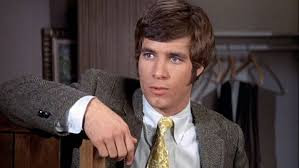 |
| The character Robbie Douglas of the 1960s TV series "My Three Sons" played by the actor Don Grady |
1) The Housemans and Kellermans were German Jews
2) The Schumachers and Pressmans were Eastern European Jews
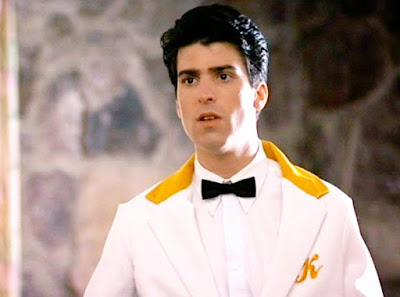
![Actor Dennis Edwards playing a waiter in the movie "Festival of Pawns" http://movie-dude.co.uk/[TV]%20%27Espionage%201.10%20Festival%20of%20Pawns%27%20(1963).htm](https://blogger.googleusercontent.com/img/b/R29vZ2xl/AVvXsEgH0LDOTMfPzyKl_ZVyddfFdzQr6i6kL6Zt1GncxAzmsKu6LOoN45FEpW1WERhugj8v6RW_UrKPli1qzZ8wNXesEyO5iCabd6gOqAI3KgrCv8e3xouV9NXDyluxZssFdAN7FpA_VeHCuPgg/s400/Dennis+Edwards+in+Festival+of+Pawns.jpg)
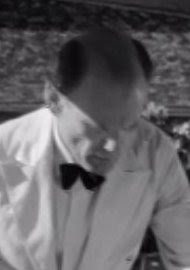


![Alf Casha playing a waiter in "The Human Jungle" http://movie-dude.co.uk/[TV]%20%27The%20Human%20Jungle%201.1%20The%20Vacant%20Chair%27%20(1963).htm](https://blogger.googleusercontent.com/img/b/R29vZ2xl/AVvXsEghrtJknUIOaGw7Py8upUUcFEA-MZrc4n6X44yidKz0ain6xK7Nr8oiJImnfhl08cnWXrbZ4RFUcmh0SpOXizh3jsM2wckHB1HXjt5qSfF_buMo3dX-AXVFb-lOKXRIkFBejk8ZSDcmCTqt/s400/Alf+Casha+Human+Jungle.jpg)
![Andrew Andreas playing a waiter in "The Human Jungle" http://movie-dude.co.uk/[TV]%20%27The%20Human%20Jungle%201.1%20The%20Vacant%20Chair%27%20(1963).htm](https://blogger.googleusercontent.com/img/b/R29vZ2xl/AVvXsEg18pO-wEBifNySwJNrLvB3boTARonN18K2f4j-fiRYhlMJy3M49U5FQiRQ5AqnDWO4wqD-6xR1sC5j6WCWs-rHp5yjR55ii3V83HR8q_HhemBPDu3PDmzQIv80nXkdjIKdHphcH70r6el5/s400/Andrew+Andreas++The+Human+Jungle.jpg)
![Pat Judge Playing a Waiter in "The Sentimental Agent" http://movie-dude.co.uk/[TV]%20%27The%20Sentimental%20Agent%201.13%20A%20Box%20of%20Tricks%27%20(1963).htm](https://blogger.googleusercontent.com/img/b/R29vZ2xl/AVvXsEgwmmUsEvEvMhgeWbtoO8nRThwnA-nX1K6nsY4LJ-QU44PJl3moRu-DUKJwIllJrTfqTBP9tZN9EFcW1aIGloZaL_N1oLwyYAI0di85hcw7P2Qoq0CpPK3KwGjTHtHC02GcNEg5MEvuX5TQ/s400/Pat+Judge++The+Sentimental+Agent.jpg)





